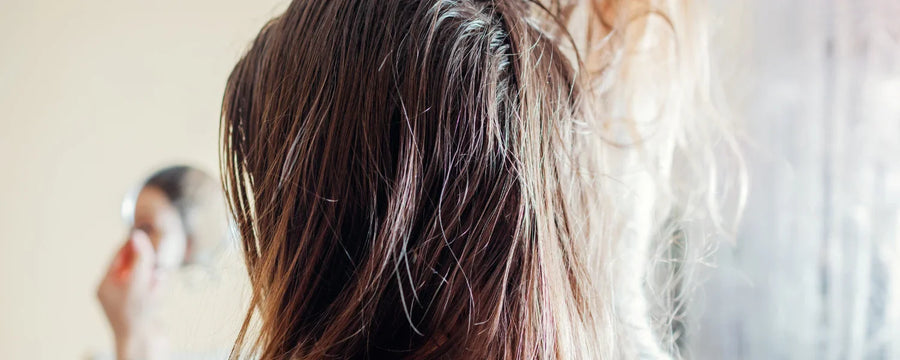
Why does my hair get greasy overnight? The nighttime habits, you should avoid
by Nitesh Sharma on Apr 30, 2025

Read through by Dorthe Kristensen
Hairdresser and former co-owner of the award-winning hairdressing chain Zoom by Zoom
With many years of experience in the hairdressing industry, Dorthe has advised many customers about hair and hair care. Dorthe has read through this blog entry to ensure high quality and professionalism. This blog post is professionally updated on April 30, 2025.
Table of contents
You've washed your hair in the evening, gone to bed with clean, fresh locks, and yet you wake up to a greasy scalp. This experience is not only common but also frustrating for many.
Unlike daytime oil buildup that results from physical activity or environmental exposure, overnight greasiness stems from a distinct set of factors related to your body’s nighttime functions and your sleep environment.
What happens to your scalp while you sleep?
Even during rest, your body is far from inactive. The sebaceous glands in your scalp continue to produce sebum, a natural oil that helps protect and moisturize your skin and hair. This process is regulated by your circadian rhythm, which can lead to heightened sebum secretion at night for some individuals.
Additionally, your body temperature typically rises during sleep, which can stimulate the scalp and spread oil along the hair shaft more easily. Night sweats, hormonal fluctuations, and the friction of your head on the pillow further contribute to this buildup.
Sleep-related causes of greasy hair
Several nighttime habits can contribute to greasy hair by morning. Factors such as your pillowcase material, how you sleep, and what products you use before bed can all play a role. Even small details like room temperature or skin contact with your hair can make a noticeable difference.
1. Pillowcase hygiene and material
The material and cleanliness of your pillowcase play a significant role in scalp and hair health. Cotton pillowcases tend to absorb oils, sweat, and product residues from your hair and skin, only to transfer them back during sleep—often leading to a greasy scalp and clogged pores. If not changed frequently, this buildup can exacerbate oiliness and irritation.
Switching to a bamboo pillowcase offers a gentler, low-friction alternative. Bamboo naturally resists bacterial buildup, reduces oil transfer, and helps minimize hair damage, making it a smarter, more hygienic choice for maintaining scalp balance.
2. Sleeping positions
Tossing and turning at night increases friction, spreading scalp oils through the hair and leading to greasiness by morning. It can also weaken the hair cuticle and cause localized oil buildup. Reducing movement and using a low-friction pillowcase helps maintain smoother, cleaner hair overnight.
3. Nighttime hair products
While applying oils or leave-in treatments before bed might seem nourishing, heavy products can actually contribute to overnight greasiness. Thick formulations tend to trap sebum and product residue close to the scalp, preventing the skin from breathing and increasing the risk of clogged follicles. This not only causes hair to appear greasy by morning but may also disrupt the scalp’s natural balance over time.
Instead, opt for lightweight, non-comedogenic treatments and apply them sparingly, ideally focusing on the mid-lengths and ends. Proper timing and product selection ensure your hair receives the benefits of overnight care without unwanted buildup.
4. Unwashed skin and oil transfer
Sleeping with makeup, facial oils, or residues on your skin can easily transfer to your hair during the night. Touching your face or sleeping on your side may spread these oils to your scalp. Warm breath and occlusive skincare products can increase greasiness. Cleanse your face and hands before bed and use lighter products to reduce transfer.
5. Sleeping in warm rooms
Warm, poorly ventilated rooms can cause sweating and stimulate excess oil production on the scalp. This sweat-and-sebum mix spreads through the hair, leading to morning greasiness. To prevent buildup, sleep in a cooler room, use breathable bedding, and wear moisture-wicking fabrics for a fresher scalp overnight.
What do you think is the biggest reason your hair gets greasy overnight?
Personal factors, that can increase overnight greasiness
Overnight oiliness varies by individual. Genetics, diet, stress, and lifestyle can all influence sebum production. Recognizing these personal triggers allows for a more tailored hair care routine, helping to reduce morning greasiness and promote healthier scalp conditions over time.
Hair texture and density
People with fine hair or thin hair tend to notice oiliness more quickly because sebum travels easily from the scalp down the hair shaft. The lack of volume in the hair offers little resistance, making any oil buildup appear more prominent. Thicker hair types, on the other hand, often experience slower oil distribution, which can delay the appearance of greasiness.
Scalp type
Your scalp type plays a crucial role in how oily your hair becomes overnight. An oily scalp naturally produces more sebum than a normal or dry scalp, often due to factors such as genetics, hormonal changes, stress, or climate. Even habits like frequent over-washing can strip the scalp of its natural oils, prompting it to overcompensate by increasing sebum production.
This heightened activity doesn’t stop while you sleep—overnight, the scalp continues to produce oil, which can spread through the hair and result in a greasy appearance by morning. Understanding your scalp type is key to managing oil production effectively.
Hormonal fluctuations
Hormones play a significant role in regulating oil production. Androgens, particularly testosterone, stimulate the sebaceous glands. Fluctuations in hormone levels—common during menstruation, puberty, pregnancy, or as a result of chronic stress—can trigger a spike in sebum secretion, especially overnight when the body is at rest but still undergoing hormonal shifts. For some individuals, this means waking up with visibly oily roots regardless of evening hair washing.
How to prevent hair from getting greasy overnight
If you regularly wake up with oily roots, it may be time to rethink your nighttime routine. Fortunately, there are several effective changes you can make that target the most common triggers of overnight greasiness. The following tips focus on adjustments to your sleep environment, haircare habits, and product choices to help keep your scalp balanced while you rest.
1. Switch out your pillowcases
Changing your pillowcases frequently—ideally every two to three days—is an essential step in maintaining scalp and hair health. Traditional cotton pillowcases tend to absorb oils, sweat, and product residues, which can transfer back onto your skin and hair. Instead, opt for smoother materials like bamboo.
Our bamboo pillowcase is a particularly effective choice, as it offers a luxuriously soft surface that minimizes friction, reduces hair breakage, and helps maintain moisture balance. Its naturally breathable and antibacterial properties also make it a hygienic option for both skin and hair health.
2. Style hair loosely for sleep
When going to bed, it’s a good idea to style your hair loosely to protect both your strands and your scalp overnight. A loose braid or a soft bun helps reduce friction against the pillow, minimizes tangling, and prevents unnecessary stimulation of the scalp, which can trigger excess oil production. Avoid tight hairstyles, as they can tug on the roots and stress the scalp. This may lead to discomfort, increased oiliness, and in some cases, even hair loss over time. Give your scalp a chance to rest during the night with a gentle, tension-free hairstyle.
3. Avoid heavy products at night
Using rich products with oils or waxes before bed can weigh hair down and contribute to buildup. Overnight, they mix with natural scalp oils, intensifying greasiness. Opt for lightweight formulas if needed, or avoid nighttime application altogether to help maintain a fresher look by morning.
4. Clean skin before bedtime
Cleanse your face and hands thoroughly before going to sleep to prevent oil, skincare residues, and other impurities from transferring to your hair. This simple step is particularly important if you tend to touch your hair or sleep on your side.
5. Cool and ventilate your bedroom
Keep your bedroom at a cooler, well-ventilated temperature to prevent overheating and nighttime sweating, both of which can stimulate oil production. Investing in breathable bedding and moisture-wicking sleepwear can also help.
When overnight greasiness signals a deeper issue
If your hair stays greasy despite changes to your routine, it may be a sign of a deeper issue. Hormonal imbalances or improper hair care can overstimulate oil production. Conditions like seborrheic dermatitis might also be the cause. If nothing helps, consult a dermatologist or trichologist for proper evaluation and treatment.
Build a night routine that supports your scalp
Waking up with greasy hair doesn’t have to be a daily struggle. By understanding what happens to your scalp while you sleep and making a few changes to your nighttime routine, you can greatly reduce the chances of overnight oil buildup.
A cleaner pillowcase, a cooler bedroom, and a bit of preventative care can go a long way in ensuring your hair stays fresh from dusk to dawn.
Get a 10% discount code sent to you
Receive the best tips and tricks for your hair from Lotte and Nanna 🥰
 2-5 day delivery
2-5 day delivery
 25.000+ satisfied customers
25.000+ satisfied customers
 Satisfaction Guarantee
Satisfaction Guarantee








